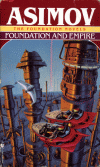I was recently stumbled an interesting page with quite a few quotes that define Science Fiction. The sources range from various famous authors that include Isaac Asimov, Frank Herbert, and Robert A. Heinlein, to unknown sources. There are a few explanations of the difference between Science Fiction and Fantasy which were quite interesting. It should be a very interesting read for any fans out there. Check it out!
What is Science Fiction?
Related Post
Avatar (2009) Directed by James CameronAvatar (2009) Directed by James Cameron
I wasn’t really planning on watching Avatar in the theater until I heard a raving review of the 3D version from my brother-in-law. He told me he immediately knew he wanted to watch it again. I have never seen a 3D movie before, so I was pretty pumped to go see it. I had heard some reports of people getting sick from watching the movie, so I admit I was a bit apprehensive during the first few minutes. The 3D didn’t really bother me initially, but after about 30 minutes I found myself getting a bit of a headache. I think it was from me trying to look around the screen checking out the different levels of depth during each scene. I decided to just relax and look where I normally would and I started to feel better.
As for the movie itself, it wasn’t an amazing, earth-shattering experience for me like many people have said it was for them. The whole idea of controlling another body remotely was rather interesting. This concept has been around a long time, but I don’t think until now controlling another biological being built with parts of your own DNA has been described. The movie was fun to watch and is most definitely a milestone in cinematography. I haven’t really gone to movies in the theater in the past few years because it has started to become so expensive, but Avatar is worth the money. If you can see it in 3D without getting sick, I’d recommend that as well. (more…)
Foundation and Empire by Isaac AsimovFoundation and Empire by Isaac Asimov
Foundation and Empire is broken up into two longer stories, rather than five shorter ones that appeared in Foundation. The first story, The General, begins almost 200 years after the Foundation was established on Terminus. The second story, The Mule, takes place just over 300 years into the Foundation Era. I think I liked this book more because the stories were longer and the character development was a bit deeper. Also, it seemed that the action picked up noticeably compared to the last book. (more…)
Isaac Asimov – The Last Question and The Last AnswerIsaac Asimov – The Last Question and The Last Answer
I’ve said here many times that Isaac Asimov is my favorite author. It wasn’t until a few years ago that I read “The Last Question,” Asimov’s favorite short story written by himself. Last night I stumbled across a story called “The Last Answer.” At first I thought, “hey, I’ve read this before,” then did a double-take. It was “Answer,” not “Question.” This story focused on the afterlife instead of entropy. They are both good stories, however I agree with Asimov in his opinion that “The Last Question” is better. I highly suggest reading them both, but I’m not sure what order to recommend. I’ll list the links in order of publication, so you decide. Read both stories before looking at the comments on either one, because they are filled with spoilers.
“The Last Question” – Isaac Asimov (1956)
“The Last Answer” – Isaac Asimov (1980)

